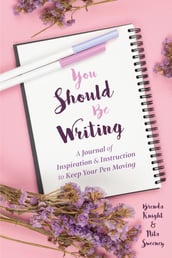I’m in the camp of people who love quotations, especially author quotes. When the blank page paralyzes me, I turn to my hefty collection of inspirational quotes and read until one strikes a chord. From there, my writing can flow.
But what makes quotations such a great way to launch a writing session?
Biology
As a species, we’re hard wired to look up to people and to trust the wisdom of anyone who has been vetted. We believe that people such as celebrities, politicians, or other individuals with any kind of stature (social media influencers anyone?) know a thing or two. It’s a time-saver. We don’t have to determine whether a person is trustworthy or intelligent, someone else selected them and we trust that. This reasoning explains why many people find inspirational and motivational quotes so delicious and why we’re prompted to recite our favorites again and again.
I enjoy using the quotes of my favorite authors as a starting place. In The Bright Forever, Pulitzer Prize finalist Lee Martin writes, “The measure of a man's character is what he would do if he knew he would never be found out.” I want to be in his company and find out what that means for me.
Mentoring
Have you ever thought about hiring a coach—someone to advise and motivate you? When a quote hits you just right, that’s what you’ve found. That external force is like the trainer counting your reps when you're at the gym or a teacher giving you an assignment so you don't have to think of one yourself.
Plus, since you resonated with the quote, you’re internalizing that message, training your mind to think a certain way. When you write about it, in your voice and hand, that inspiration becomes your own. You create an inner cheerleader that helps you move forward. When Jenim Dibie tells me, “Silence is a cage. These words are my wings.” I want to write!
Perspective
Sometimes a quote offers a different way to look at something. It might bring up something you hadn't thought of before.
A quote that really makes you stop and think, provides the perfect opportunity to write. Someone else's wisdom may open a space in your mind and heart, allowing you to dig deeper.
This happened to me when I first heard Shinzen Young say, "This too is passing." Not "This too shall pass" which we all hear often. But this too is ALREADY passing. That opened me to the present moment. I wrote about being mindful in my running and mental health memoir and continue to write about meditation and mindfulness. I repeatedly use this quote as a prompt because it jars me out of waiting for tomorrow and turns conventional thinking on its ear.
Companionship
A quote can also serve as a virtual friend to comfort you as you begin.
I've written long enough that the blank page ought not to terrorize me, but some days, it still does. Writing is a lonely business. On those days, I need a friend to hold my hand while I begin. Once I get going, I'm fine. I relax into the rhythm. Ideas flow. Why not reach out to a "friend," a really inspiring and calming friend like Zen teacher Joko Beck--“Life always gives us exactly the teacher we need at every moment.” Or perhaps your favorite writing star, such as Stephen King. “Get busy living or get busy dying.”
Let someone you admire be that friend for the moment and let them calm, inspire, and motivate you enough to get started.
Reduces Complexity
Many quotes distill a complex idea to its essence. You get the gist of it quickly and then can riff off on your own path. A quote is a bite-sized bit of wisdom. It may contain the entire idea as a summary or it might just be a hint of the entire document from which it was pulled. While a summary or tidbit might not work for a research paper, a nibble of an idea serves as the perfect place to start writing. From there, you can build your own ship, dive into your own heart. You don't need someone to tell you the whole story. You're only looking for a point of entry.
Affirmation
We’re often drawn to quotes that echo what we believe. Or sometimes, quotes that refute what we believe can help us form arguments to shape what we do know.
Using a quotation as a starting point may allow you to affirm your truth. You read it and nod. You sigh into the feeling that you've found your tribe. The person quoted "gets" you. With that affirmation, your pen begins to move or your fingers type almost on their own. You smile as you write, feeling warmth in your heart and solidness in your gut showing you you're on the right track.
By contrast, you might read a quote and think, "No. That's not what I believe." This happens with me when I see the quote "Good vibes only." Any quote negating the fact that life includes both positive and negative, evokes a visceral response. From that energy I write my own point of view. It may result is a deeper understanding of myself. Or, if I just keep going, I might come to a place of understanding as to why the person said that, and how it can be true for me as well.
The next time you’re ready to write, try pulling a quote and riffing from there. You’ll be in fabulous company with a tremendous coach and soon you’ll be cheering yourself on!
 Author bio: Nita Sweeney is the award-winning author of the
Author bio: Nita Sweeney is the award-winning author of the running and mental health memoir, Depression Hates a Moving Target: How Running with My Dog Brought Me Back from the Brink and coauthor of the writing journal, You Should Be Writing. Nita coaches creatives in writing and meditation, blogs at Bum Glue, and publishes the monthly email newsletter, Write Now Columbus. She lives in central Ohio with her husband, Ed, and their yellow Labrador retriever, Scarlet.
running and mental health memoir, Depression Hates a Moving Target: How Running with My Dog Brought Me Back from the Brink and coauthor of the writing journal, You Should Be Writing. Nita coaches creatives in writing and meditation, blogs at Bum Glue, and publishes the monthly email newsletter, Write Now Columbus. She lives in central Ohio with her husband, Ed, and their yellow Labrador retriever, Scarlet.


Leave Comment